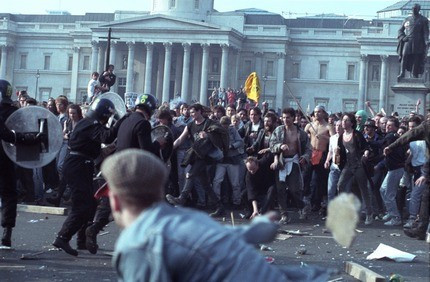Is Bedroom Tax David Cameron's Poll Tax Moment?

When former Tory prime minister Margaret Thatcher introduced the community charge to replace the local rates system in 1990 it quickly became branded the poll tax, sparked riots on the streets of London and ultimately contributed to her downfall. It was seen as the clearest indication that she had lost her once sure touch with voters.
No one believes David Cameron's bedroom tax - which he similarly insists is not a tax but the removal of the "spare room subsidy" for social housing tenants - will repeat history. But there are clear signs that the government is becoming nervous about the policy.
Six months since its introduction and the latest figures, gathered by the False Economy campaign group and TUC through FoI requests to 114 local councils, show that one third of people are affected by it. Some 50,000 tenants have fallen into rent arrears and could be facing eviction - if there was anywhere to evict them to.
Under the policy, families in social housing deemed to have spare bedrooms have their benefits cut by up to 25%. The aim is to get them to downsize their property to free up homes for those with large families and tackle the housing crisis.
But there is a severe shortage of smaller homes because of the lack of new builds and the scheme has already thrown up anomalies, specifically for some disabled claimants, and led to claims of families being forced out of homes they have occupied for a long time.
Ministers are eager to stress that they are "carefully monitoring" the system to see how it works and who is affected, leading some on the Opposition benches to believe the policy was not thought through in the first place and that the government is starting to backtrack.
Vulnerable people
Ministers also point out they have already dealt with more obvious unfairnesses and made £190m available to local authorities to help those unfairly hit by the move.
But that has led to suggestions by the TUC that the policy will not save the huge sums claimed by the government and, in any case, when the cash runs out there will be an increase in problems.
UN official Raquel Rolnik was recently lambasted by the government after claiming that the policy was causing stress and anxiety to very vulnerable people.
The real worry for David Cameron, who has been forced to defend the policy repeatedly in the Commons, is that it is doing to him exactly what the poll tax did to Thatcher - allowing him to be portrayed as out of touch and targeting the most vulnerable in society, exactly the focus of Labour's campaign against the coalition government
Like Thatcher, Cameron will claim his proposal is addressing unfairnesses in the system, specifically that there is no subsidy in the private sector. He also points to the runaway cost of the housing budget which has increased from £11bn in 2000 to £24bn now.
But, just as with the poll tax, it is those hit by the proposal who will attract attention and, because of the nature of social housing schemes, they are certain to be some of the least well-off in society.
So Labour's claims that Cameron offers tax cuts to the rich while penalising the poor will have increased resonance.
Shadow work and pensions secretary Liam Byrne greeted the latest figures saying: "These appalling figures prove once and for all that, while this government stands up for a privileged few, a debt bombshell is exploding for a generation of people." And he repeated Labour's call for it to be abolished.
There is no chance of that happening as it would represent a major U-turn. But what some now believe is that ministers will be forced to reform the system to such an extent that, they hope, little will remain of the original proposal.
© Copyright IBTimes 2025. All rights reserved.






















